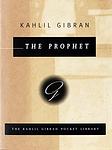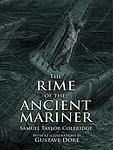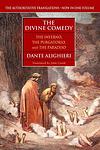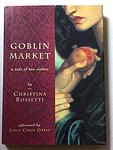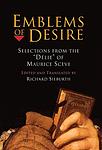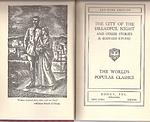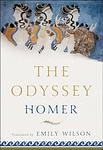The Greatest "Allegorical, Fiction, Poetry" Books of All Time
Click to learn how this list is calculated.
This list represents a comprehensive and trusted collection of the greatest books. Developed through a specialized algorithm, it brings together 305 'best of' book lists to form a definitive guide to the world's most acclaimed books. For those interested in how these books are chosen, additional details can be found on the rankings page.
Genres
Allegorical books are a genre of literature that use symbolic characters, events, and settings to convey a deeper meaning or message. These stories often have a moral or philosophical lesson that is meant to be interpreted by the reader. Allegories can be found in many different types of literature, including novels, short stories, and poetry. They are a powerful tool for exploring complex ideas and emotions, and can be used to comment on social, political, or religious issues. Overall, allegorical books are a thought-provoking and engaging genre that challenges readers to think critically and reflect on the world around them.
Poetry is a genre of literature that uses language to evoke emotion, paint vivid imagery, and convey complex ideas through the use of rhythm, meter, and sound. It is characterized by its use of figurative language, such as metaphors and similes, and its ability to capture the essence of a moment or experience in a concise and powerful way. Poetry can take many forms, including sonnets, haikus, free verse, and spoken word, and can cover a wide range of topics, from love and nature to politics and social issues. As a category for books, poetry offers readers a unique and intimate glimpse into the human experience, inviting them to explore the beauty and complexity of language and the world around them.
Countries
Date Range
Reading Statistics
Click the button below to see how many of these books you've read!
Download
If you're interested in downloading this list as a CSV file for use in a spreadsheet application, you can easily do so by clicking the button below. Please note that to ensure a manageable file size and faster download, the CSV will include details for only the first 500 books.
Download-
1. The Divine Comedy by Dante Alighieri
In this epic poem, the protagonist embarks on an extraordinary journey through Hell (Inferno), Purgatory (Purgatorio), and Paradise (Paradiso). Guided by the ancient Roman poet Virgil and his beloved Beatrice, he encounters various historical and mythological figures in each realm, witnessing the eternal consequences of earthly sins and virtues. The journey serves as an allegory for the soul's progression towards God, offering profound insights into the nature of good and evil, free will, and divine justice.
The 27th Greatest Book of All Time -
2. Paradise Lost by John Milton
"Paradise Lost" is an epic poem that explores the biblical story of Adam and Eve's fall from grace in the Garden of Eden. It delves into their temptation by Satan, their subsequent expulsion, and the consequences of their disobedience. The narrative also provides a complex portrayal of Satan as a rebellious angel, who, after being cast out of Heaven, seeks revenge by causing mankind's downfall. The poem is a profound exploration of free will, divine justice, and the human struggle with good and evil.
The 107th Greatest Book of All Time -
3. The Prophet by Kahlil Gibran
"The Prophet" is a collection of poetic essays that are philosophical, spiritual, and, above all, inspirational. The central character, a prophet, is about to board a ship which will carry him home after 12 years spent living in a foreign city. Before he departs, he is stopped by a group of people, with whom he discusses topics such as life and the human condition. The book is divided into chapters dealing with love, marriage, children, giving, eating and drinking, work, joy and sorrow, houses, clothes, buying and selling, crime and punishment, laws, freedom, reason and passion, pain, self-knowledge, teaching, friendship, talking, time, good and evil, prayer, pleasure, beauty, religion, and death.
The 519th Greatest Book of All Time -
4. The Rime of the Ancient Mariner by Samuel Taylor Coleridge
"The Rime of the Ancient Mariner" is a classic English poem that tells the story of a mariner who kills an albatross, bringing bad luck and hardship on himself and his ship's crew. The mariner's journey becomes a spiritual quest as he is forced to confront the consequences of his actions and the nature of redemption. The poem is known for its vivid and imaginative language, including the famous line, "Water, water, everywhere, Nor any drop to drink."
The 673rd Greatest Book of All Time -
5. Complete Poems of Giacomo Leopardi by Giacomo Leopardi
This book is a comprehensive collection of the poetic works of a renowned Italian poet. The poems cover a wide range of themes, from love and nature to philosophy and social issues, showcasing the poet's profound understanding of human nature and the world. The collection also includes his celebrated "Canti" and other lesser-known works, all presented in their original Italian language, making it a valuable resource for those interested in Italian literature and culture.
The 837th Greatest Book of All Time -
6. The Faerie Queene by Edmund Spenser
"The Faerie Queene" is an epic allegorical poem that follows several medieval knights, representing various virtues, as they navigate quests assigned by the Faerie Queene. The narrative is deeply imbued with Christian symbolism and Elizabethan political allegory. Each book in the series focuses on a particular virtue and the knight who embodies it, presenting a complex, interconnected tapestry of moral, ethical, and political conduct. The poem is renowned for its intricate allegories, rich characterization, and the creation of a unique verse form known as the Spenserian stanza.
The 843rd Greatest Book of All Time -
7. Fables of La Fontaine by Jean de La Fontaine
"Fables of La Fontaine" is a collection of moralistic tales, often involving animals and inanimate objects with human characteristics. These stories, written in verse, offer valuable life lessons and social commentaries. They are acclaimed for their wit, wisdom, and the skill with which they are told, making them enduring classics in the world of literature.
The 2176th Greatest Book of All Time -
8. The Twelve by Alexander Blok
"The Twelve" is a controversial and symbolist Russian poem that weaves together the chaotic and transformative energy of the 1917 Russian Revolution with mystical and religious elements. Set against the backdrop of a blizzard in Petrograd, the narrative follows twelve Red Army soldiers as they march through the city's streets, grappling with their purpose and the violent upheaval of the old order. The poem is renowned for its vivid imagery, complex allegories, and the provocative inclusion of a Christ-like figure amidst the revolutionary fervor, challenging readers to interpret the convergence of spiritual and political themes.
The 3685th Greatest Book of All Time -
9. A Poem Without A Hero by Anna Akhmatova
The book is a profound reflection on the nature of memory, history, and the enduring impact of war. Through a series of interconnected poems, the work weaves together personal and collective experiences, focusing on the tumultuous events of the Russian Revolution and the subsequent Stalinist era. The poet grapples with the themes of loss, betrayal, and the search for redemption, while also paying homage to the artists and thinkers who suffered under repressive regimes. Rich in allusions and steeped in a complex interplay of voices and time periods, the narrative serves as a poignant meditation on the role of the poet and the power of poetry to bear witness to the tragedies of the past.
The 3727th Greatest Book of All Time -
10. Le Roman de la Rose by Guillaume (de Lorris)
"Le Roman de la Rose" is a medieval French poem styled as an allegorical dream vision. The narrative focuses on a courtier who dreams of a beautiful rose within a walled garden, representing his romantic pursuit of a lady. The poem explores themes of love, desire, and courtly manners, and is imbued with symbolism and allegory, making it a significant work in the tradition of courtly love literature.
The 3791st Greatest Book of All Time -
11. Jerusalem Delivered by Torquato Tasso
The epic poem unfolds during the First Crusade, depicting Christian knights led by Godfrey of Bouillon as they lay siege to Jerusalem, aiming to recapture the holy city from Muslim control. The narrative weaves together themes of love, valor, and chivalry, with a cast of characters that includes the brave knight Rinaldo and the enchanting sorceress Armida. As the warriors confront various supernatural and earthly challenges, the poem explores the conflict between Christian duty and personal passion, ultimately celebrating the virtues of heroism and piety in the quest for divine providence and the triumph of Christian faith.
The 4151st Greatest Book of All Time -
12. Lycidas, Comus, And The Minor Poems by John Milton
This collection brings together some of the most notable early works of a seminal figure in English literature, showcasing his mastery of verse and profound engagement with themes of morality, virtue, and the human condition. "Lycidas" is an elegy that mourns the death of a friend while meditating on the poetic vocation and the nature of life and death. "Comus" is a masque that explores the struggle between chastity and licentiousness through the story of a virtuous lady resisting the temptations of the titular enchanter. The minor poems included offer a glimpse into the writer's development as a poet, with pieces that range from the pastoral to the personal, reflecting both classical influences and innovative poetics that would come to characterize his later, more epic works.
The 4151st Greatest Book of All Time -
13. The Inferno by Dante Alighieri
The book is an epic poem that takes the reader on a profound journey through the nine circles of Hell, guided by the ancient Roman poet Virgil. The narrative follows the author's alter ego as he embarks on a quest for salvation, encountering the souls of the damned and witnessing the divine justice meted out for their earthly sins. The vivid and often harrowing depictions of the torments suffered by the inhabitants of the underworld serve as an allegory for the spiritual trials that individuals must overcome. This journey is not only a personal one but also represents the soul's path towards God, exploring themes of morality, redemption, and the nature of sin.
The 4675th Greatest Book of All Time -
14. The Poems Of William Dunbar by William Dunbar
This collection brings together the poetic works of a prominent Scottish poet from the late 15th and early 16th centuries, known for his keen wit and masterful command of Middle Scots. The poems range from the humorous to the somber, offering a rich tapestry of themes that include moral and religious reflections, satirical commentary on the court and society of his time, and deeply personal musings. The poet's most famous works, such as his lament for the state of the world and his expressions of the transitory nature of life, showcase his skill in both lyrical and narrative forms, making this anthology a valuable window into the literary and cultural milieu of medieval Scotland.
The 4916th Greatest Book of All Time -
15. Mensagem by Fernando Pessoa
"Mensagem" is a collection of 44 poems that pay homage to Portugal's heroic past, particularly its Age of Discovery. The work is divided into three parts: the first part focuses on the country's mythical origins, the second part celebrates the nation's maritime explorations and discoveries, and the third part reflects on the decline and future resurrection of Portugal. The author uses symbolic and allegorical language to convey his deep love for his homeland and his belief in its potential for greatness.
The 5030th Greatest Book of All Time -
16. Goblin Market by Christina Georgina Rossetti
"Goblin Market" is a narrative poem that explores themes of temptation, sacrifice, and salvation through the story of two sisters, Laura and Lizzie, who encounter goblin merchants selling a variety of luscious, enchanted fruits. Despite warnings, Laura succumbs to the temptation and indulges in the fruit, leading to a decline in her health and spirit. Lizzie, determined to save her sister, bravely confronts the goblins and resists their temptations, ultimately purchasing the antidote with her courage and purity. The poem culminates in a powerful act of sisterly love and redemption, as the bond between the siblings triumphs over the malevolent forces.
The 6083rd Greatest Book of All Time -
17. The Deserted Village by Oliver Goldsmith
The poem laments the decline of rural life and the depopulation of the countryside, focusing on a fictional village that has fallen victim to the enclosures and social changes of the time. It nostalgically recalls the once-thriving community, with its school, its church, and its happy inhabitants, contrasting this idyllic past with the desolation and despair that have taken over since the wealthy have appropriated the common lands. The poet reflects on themes of corruption, the destructive impact of materialism, and the loss of pastoral innocence, ultimately critiquing the societal transformations that have led to the erosion of traditional rural values and ways of life.
The 7168th Greatest Book of All Time -
18. Délie by Maurice Scève
This 16th-century collection of 449 interconnected poems, known as blasons, is a seminal work of French Renaissance literature that explores the theme of courtly love through the adoration of an idealized woman, referred to as Délie. The poems are dense with allegorical and Neoplatonic imagery, reflecting the intellectual and artistic currents of the time. The work is structured around the use of emblems, each consisting of a motto, an emblematic image, and an accompanying poem, which together weave a tapestry of emotional and philosophical reflections on love, beauty, suffering, and the quest for spiritual and intellectual fulfillment.
The 7168th Greatest Book of All Time -
19. Lutrin by Nicolas Boileau-Despréaux
"Lutrin" is a mock-heroic poem that satirizes the petty squabbles and absurdities of 17th-century French society through the lens of a seemingly trivial conflict within a church. The narrative humorously details the dispute over the placement of a lectern between two factions of church officials, elevating the triviality of their concerns to epic proportions. The poem employs wit and classical references to parody the grandiose style of epic poetry, using its clever verse to critique the pretensions and vanities of the author's contemporaries, while also reflecting on the human tendency towards discord over inconsequential matters.
The 7168th Greatest Book of All Time -
20. The Chimeras by Gérard de Nerval
"The Chimeras" is a collection of sonnets that delves into the realms of mythology, history, and personal introspection, weaving a tapestry of allegorical and symbolic imagery. The work reflects the author's fascination with the occult, the dreamlike, and the struggle between idealism and reality. Through the use of classical references and a deeply personal voice, the poems explore themes of love, despair, and the search for transcendence, offering a poignant look at the human condition and the poet's own troubled psyche. The sonnets stand as a testament to the author's lyrical prowess and his ability to find beauty amidst the shadows of his own mental turmoil.
The 7168th Greatest Book of All Time -
21. Aurelia by Gérard de Nerval
"Aurelia" is a semi-autobiographical narrative blending reality with dreamlike visions, where the protagonist embarks on a profound and surreal journey through his psyche following a descent into madness. The work is a poignant exploration of the author's own experiences with mental illness, unrequited love, and existential anguish. It delves into themes of the supernatural, the occult, and the interplay between dreams and waking life, as the narrator seeks to reconcile his internal turmoil and find a deeper understanding of his soul and the universe. The narrative is rich with symbolic imagery and introspective passages that reflect the author's fascination with the mystical and his quest for spiritual transcendence.
The 7168th Greatest Book of All Time -
22. The City Of The Dreadful Night by James Thomson
"The City of the Dreadful Night" is a long poem that delves into the profound depths of existential despair and the search for meaning in a seemingly indifferent universe. Set within a dark, sprawling city that symbolizes a world devoid of hope and faith, the poem's melancholic tone and bleak imagery reflect the author's own struggles with depression and disillusionment. Through a series of encounters with various inhabitants of the city, the narrative explores themes of loneliness, the human condition, and the quest for solace in an uncaring world, ultimately presenting a stark, pessimistic view of life without the consolation of religious belief or the possibility of redemption.
The 7168th Greatest Book of All Time -
23. Hymns To The Night by Novalis
"Hymns to the Night" is a collection of six prose hymns that delve into the profound depths of night as a metaphor for the mystical and the transcendent. The work reflects on the dichotomy between darkness and light, with the night representing a sanctuary from the rationality and order of the day. It is a deeply romantic text that celebrates the beauty and solace found in the nocturnal realm, where the spiritual and the eternal are felt more acutely. The hymns are a blend of personal longing, philosophical contemplation, and spiritual quest, expressing a yearning for the infinite and the reunion with a lost beloved, symbolizing the soul's journey towards oneness with the divine.
The 7168th Greatest Book of All Time -
24. The Odyssey by Nikos Kazantzakis
The book in question is a modern sequel to Homer's classic epic, "The Odyssey," reimagining the adventures of its hero in the 20th century. After the fall of Troy, the protagonist embarks on a long and arduous journey back to his homeland, facing numerous trials and tribulations along the way. The narrative explores themes of heroism, the search for meaning, and the struggle against fate, as the protagonist encounters a host of new characters and challenges, ultimately striving to understand his place in a world that has vastly changed since his time in ancient myth.
The 7168th Greatest Book of All Time -
25. Paradise Regained by John Milton
This epic poem is a sequel to a much longer work and focuses on the biblical story of Jesus Christ's temptation by Satan in the wilderness. Over the course of four books, the narrative explores the intellectual and spiritual battle between the Son of God and the devil, who attempts to seduce him with various arguments and worldly temptations. However, Jesus remains steadfast in his faith and virtue, ultimately reclaiming the paradise that was lost by Adam and Eve's fall from grace. The poem celebrates the themes of redemption, the triumph of good over evil, and the wisdom and strength gained through suffering and temptation.
The 7168th Greatest Book of All Time
Reading Statistics
Click the button below to see how many of these books you've read!
Download
If you're interested in downloading this list as a CSV file for use in a spreadsheet application, you can easily do so by clicking the button below. Please note that to ensure a manageable file size and faster download, the CSV will include details for only the first 500 books.
Download

